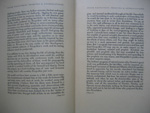PETER KROPOTKIN: TRIBUTES & APPRECIATIONS
Thinking people, these are hollow victories, the last and most hideous manifestations of Authority, digging its own grave by creating at last an immense desire for real freedom and good fellowship, and leading inevitably up to the time when all the seeds scattered by Kropotkin and so many other Anarchists will bear fruit. When in some countries the present system was discredited and broke down, it was probably inevitable that large parties and masses, eager for power and materially dissatisfied and hungry, should first grasp the reins of power and adopt rough authoritarian measures.
Freedom's turn comes next, and the question as to what extent coming events will be more directly inspired by freedom than those since 1917 have been, is the great problem before us. We are in the very midst of this development, and a definite estimate of Kropotkin's work and its lasting influence must be postponed.
It is sufficient to say that during his life of activity, from the 'sixties ntill 1914, he did whatever man could do, and that few lives are so teeming with continuous work, work for science and the elaboration of ideas, work for propaganda and the spreading of ideas, all this accompanied by hard work for a modest livelihood for himself and family. It is in this respect, as a hard-working man of rare and immense activity, that I will consider Kropotkin just now.
He would not have been averse to a life a little more easy, but circumstances chained him to his work for between fifty and sixty years, and, once at work, he worked away with great intensity. I believe that his ideas were formed by a slow process of gathering materials and observations with scientific ardour, and then basing conclusions upon them. Once these conclusions were formed, be it in the 'sixties or thirty years later, they got hold of him to an incredible de-
[ Page 12 ]
gree, and seemed unalterable throughout his life Henceforth he would be untiring to seek confirmation of these ideas, but he would far less seem to be inclined or to find tme to reexamine them and to revise their foundation. To me, at least, this rigid adherence to all he had ever observed, be it in the early sixties, and which his memory retained wonderfully, appeared somewhat strange, and leading to a degree of isolation in face of the ever-progressing advance of research. I should have wished to see his ideas thrown into the crucible of general scientific discussion to a much greater extent than they were, modified by criticism, augmented by the efforts of many others, and then they might be before us now in a more permanent and general, less personal form. But I recognize that many reasons prevented this and fixed Kropotkin, if I may say so, in some respect on the borderline between scientist and prophet. Scientists are plentiful and prophets also, but men nourished by true science and transforming it by themselves and spreading it like prophets are very scarce, and Kropotkin's position was in some respects unique.
The brilliant progress of natural science after Darwin's great work was published in the late fifties, and the immense undeveloped resources of Russia and Siberia, which Kropotkin
learnt to appreciate by his travels, stimulated his interest for natural science, and he became an active worker upon this immense field, which even in autocratic Russia was relatively undisturbed. But here his natural unselfishness interfered, and when he saw the downtrodden state of the people, to whom the natural riches and mineral wealth of Russia, and all the researches of Darwin, Huxley, and Spencer meant absolutely nothing, he threw up the scientific career and cast in his lot with those who prepared the Russian Revolution.
[page 13]
|

|